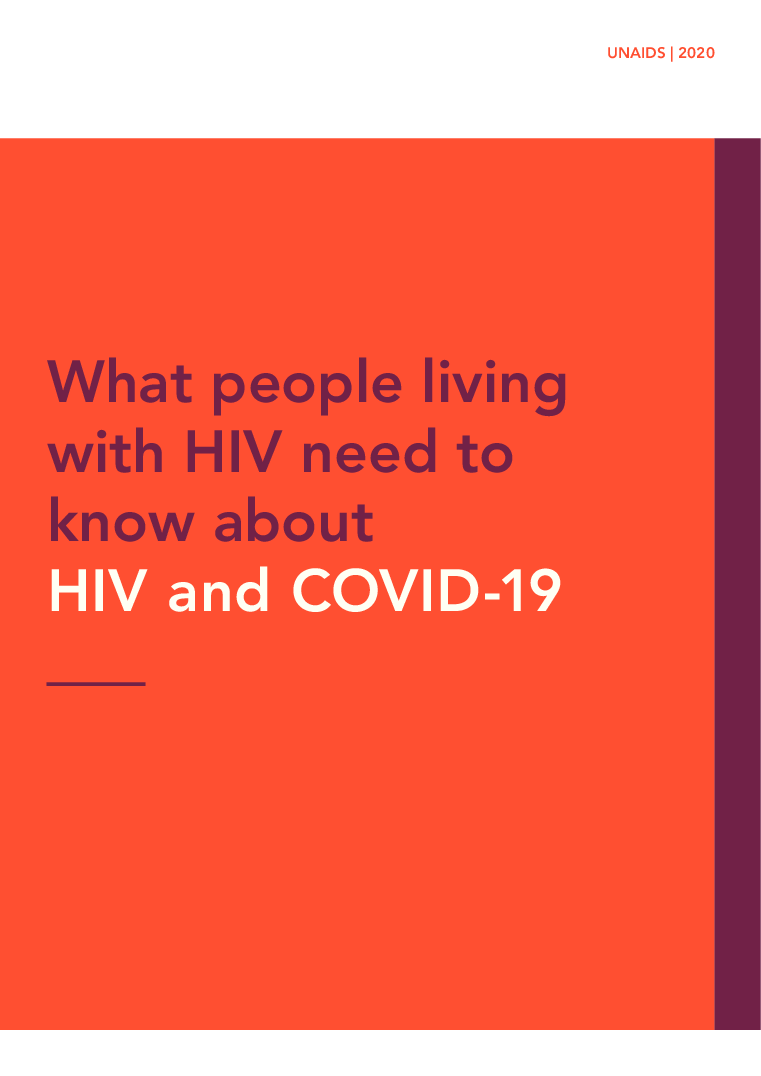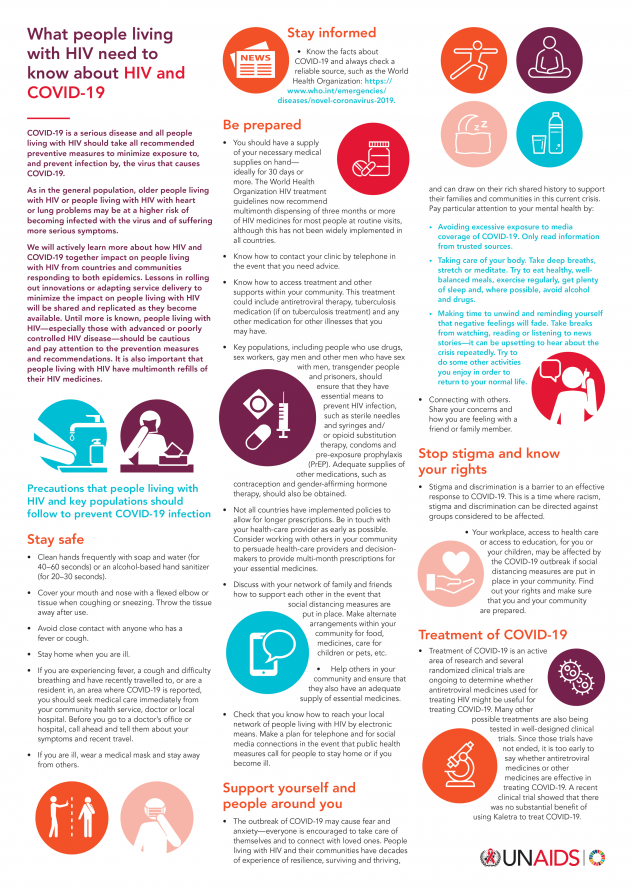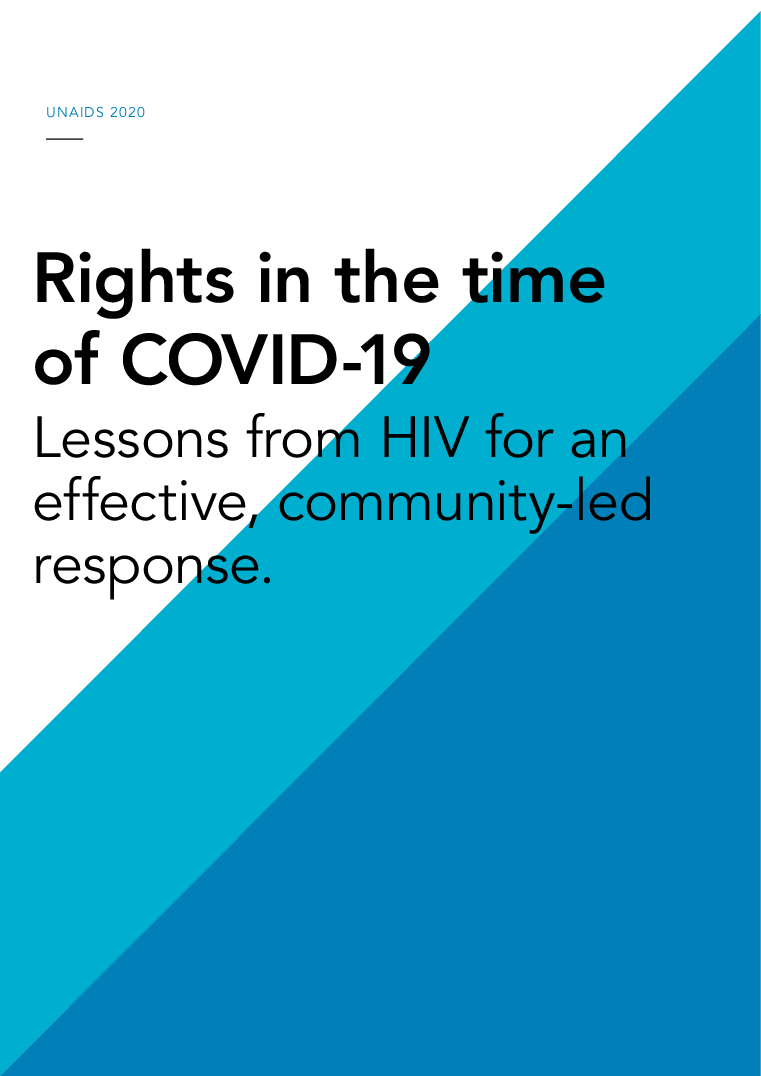
What people living with HIV need to know about HIV and COVID-19
By UNAIDS – Friday, March 26, 2020
These are difficult times for all of us. UNAIDS is urging people to act with kindness, not stigma and discrimination—people affected by COVID-19 are part of the solution and must be supported.
Governments must respect the human rights and dignity of people affected by COVID-19. The experiences learned from the HIV epidemic can be applied to the fight against COVID-19. As in the AIDS response, governments should work with communities to find local solutions. Key populations must not bear the brunt of increased stigma and discrimination as a result of the COVID-19 pandemic.
We know that COVID-19 is a serious disease that is set to hit the countries with the highest burden of HIV very soon. Everyone, including people living with HIV, should take the recommended precautions to reduce exposure to COVID-19:
- Regular and thorough hand washing with soap and water or alcohol-based hand rub.
- Maintain at least 1 metre distance between yourself and anyone who is coughing or sneezing.
- Avoid touching your eyes, nose and mouth.
- Make sure that you, and the people around you, follow good respiratory hygiene—cover your mouth and nose with your bent elbow or tissue when you cough or sneeze and dispose of the used tissue immediately.
- Stay home if you feel unwell. If you have a fever, cough and difficulty breathing, seek medical attention and call in advance. Follow the directions of your local health authority.
UNAIDS recognizes, however, that in many countries, owing to weaker health-care systems, informal settlements, overcrowded cities and public transportation and a lack of clean water and sanitation, the current approaches to self-protection, social distancing and containment may not be viable.
COVID-19 and people living with HIV
COVID-19 is a serious disease and all people living with HIV should take all recommended preventive measures to minimize exposure to, and prevent infection by, the virus that causes COVID-19. As in the general population, older people living with HIV or people living with HIV with heart or lung problems may be at a higher risk of becoming infected with the virus and of suffering more serious symptoms. All people living with HIV should reach out to their health-care providers to ensure that they have adequate stocks of essential medicines.
Despite the scale-up of HIV treatment in recent years, 15 million people living with HIV do not have access to antiretroviral therapy, which may compromise their immune systems.
We will actively learn more about how HIV and COVID-19 together impact on people living with HIV from countries and communities responding to both epidemics. Lessons in rolling out innovations or adapting service delivery to minimize the impact on people living with HIV will be shared and replicated as they become available. Until more is known, people living with HIV—especially those with advanced or poorly controlled HIV disease—should be cautious and pay attention to the prevention measures and recommendations. It is also important that people living with HIV have multimonth refills of their HIV medicines.
What UNAIDS is doing
UNAIDS is working with governments and community partners to:
- Carry out surveys to assess information needs, medication available and ability to access service support networks.
- Find out if multimonth dispensing of antiretroviral therapy is being fully implemented, and, if not, identify how to implement it.
- Assess the possibility of HIV service interruption and develop plans for access to those services.
What UNAIDS recommends
HIV services must continue to be made available for people living with and at risk of HIV. This includes ensuring the availability of condoms, opioid substitution therapy, sterile needles and syringes, harm reduction, pre-exposure prophylaxis and HIV testing.
To prevent people from running out of medicines and to reduce the need to access the health system, countries should move to the full implementation of multimonth dispensing of three months or more of HIV treatment.
There must be access to COVID-19 services for vulnerable people, including a targeted approach to reach those most left behind and removing financial barriers, such as user fees.
Link to original article: https://www.unaids.org/en/
Share post





